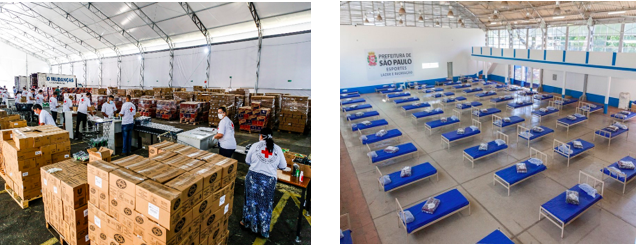[asvc_header_block title=”Actions for Vulnerable Groups” subtitle=”São Paulo City” header_font_size=”h1″ align=”center” fontsize=”medium” line=”0″] 

According to the 2019 Population Census, 24,344 people are homeless in São Paulo. Thus, the City Hall has engaged efforts to guarantee support to the homeless and vulnerable population, increasing its investments in order to have enough shelters available to take them off the streets. Nonetheless, the city has made public notice to hotels located in São Paulo, asking them to receive elderly homeless people, with all costs covered by the municipality, because they constitute a very high-risk population for Covid-19.
FEATURES
- The social assistance network has created eight new emergency shelters, which corresponded to 680 vacancies in the five regions of the city. In the central region of the city, stations were installed to offer better conditions to the homeless population, with access to meals, bathrooms, hygiene kits, and healthcare guidelines.
- Throughout the city, it was also installed twenty-four sinks with potable water to homeless people to wash their hands during this pandemic period of COVID-19.
- Accredited restaurants already provided around 170,000 meals for homeless people. The initiative intends to make up for the scarcity of food supply for this population in great vulnerability and allows small restaurants to endure the financial crisis.
ONGOING RESULTS
- Ensure the rights of housing for a population in a situation of vulnerability, which does not have a safe place in the quarantine period. The equipment is open 24 hours a day.
- Guarantee the access of proper hygienic, thus preventing the spread of the COVID 19. 3.600 hygiene kits were distributed through a partnership between the Municipal Human Rights and Citizenship Secretariat alongside the Colgate Company and International Red Cross. The expectation is to increase to 100 the number of public sinks.
- The Municipal Human Rights and Citizenship Secretariat opened the public accreditation notice for small businesses and restaurants, enabling income generation from the meals’ distribution during the socio-economic crisis caused by the coronavirus quarantine.
Source(s): Capital, Prefeitura

